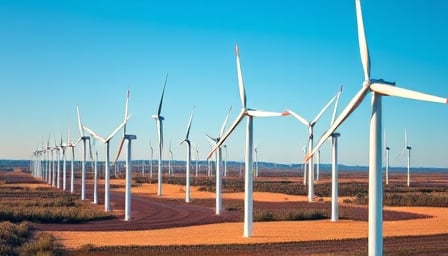Vestas Wind Systems Faces Volatile Trading Amid Geopolitical Concerns
In a day marked by sharp fluctuations, the shares of Vestas Wind Systems A/S—one of the world’s preeminent manufacturers of wind turbines—traded on the OMX Nordic Exchange Copenhagen AS with a mix of optimism and apprehension. While the Danish company secured two new contracts in Argentina totaling 217 MW, its market value slipped, at one juncture falling by as much as 4.8 percent. The divergent signals sent by market participants illustrate the delicate balance between expanding market opportunities and the uncertainties that accompany policy shifts in key jurisdictions.
Argentina Orders: A Silver Lining
Vestas’ recent announcement of the Argentine contracts serves as a tangible testament to the company’s continued penetration into emerging markets. The 217 MW of wind power capacity is poised to reinforce Vestas’ onshore footprint, reinforcing its reputation for delivering reliable turbines at competitive margins. Analysts view this development as an incremental yet meaningful boost to the company’s revenue pipeline, especially amid a global push for renewable energy.
Nevertheless, the market’s reaction suggests that the positive impact of the Argentine orders is being eclipsed by a broader concern about the stability of the company’s operating environment—particularly in Europe, where policy decisions can dramatically alter investment flows.
German Policy Worries Undermine Confidence
The German government’s announced intent to temper its renewable energy investment pace has resonated strongly among investors. Germany, long considered a bellwether for European wind power deployment, is a critical market for Vestas. Any slowdown in subsidies or regulatory support could constrain future project pipelines, thereby dampening Vestas’ projected earnings.
Market participants interpret these policy moves as a potential threat to the Danish firm’s long‑term growth prospects. This sentiment is compounded by the fact that Germany remains a leading hub for offshore wind development, a sector where Vestas has historically dominated. Consequently, the perceived vulnerability to German policy has translated into tangible sell‑pressure on Vestas’ shares.
GE Vernova’s Commentary Adds Fuel to the Fire
Adding a further layer of complexity, comments from GE Vernova’s leadership—an established competitor in the wind turbine arena—have amplified investor wariness. While the specifics of the remarks have not been disclosed in full, market analysts suggest that they hint at intensified competition or strategic shifts that could erode Vestas’ market share. In an industry where differentiation hinges on technological advancement, reliability, and after‑sales service, any perceived narrowing of Vestas’ competitive edge can quickly erode investor confidence.
JP Morgan’s “Overweight” Stance Balances the Narrative
Amid these headwinds, JP Morgan Chase has reiterated its “overweight” recommendation for Vestas. The firm cites robust demand for both onshore and offshore wind capacity, asserting that the company’s market position remains resilient in the face of political turbulence. JP Morgan’s analysts argue that recent headlines surrounding U.S. offshore wind developments are “noise” that does not fundamentally alter Vestas’ investment thesis. Their assessment underscores confidence in the company’s technological capabilities, supply‑chain management, and long‑term service contracts—all factors that underpin sustainable profitability.
Market Volatility Reflects Mixed Sentiment
The day’s trading pattern, marked by swings that pulled Vestas’ share price down to 4.8 percent at one point, encapsulates a broader dichotomy among investors. On one hand, the Argentine contracts and JP Morgan’s bullish outlook signal confidence in Vestas’ ability to capture growth in emerging markets and to maintain its leadership in the competitive wind sector. On the other hand, apprehensions regarding German policy and competitive pressure from GE Vernova have induced caution, leading to a pronounced decline in market sentiment.
Looking Ahead
As Vestas navigates these competing forces, the company’s strategic focus appears to remain on consolidating its technological edge and expanding its global footprint. The Argentine deals represent a tangible foothold in new markets, while the company’s ongoing research into offshore turbines positions it well for the next wave of global renewable energy deployment.
Investor sentiment will likely continue to oscillate as new data on German policy decisions surface and as GE Vernova’s competitive maneuvers unfold. For now, Vestas stands at a crossroads where strategic execution, policy advocacy, and market perception will jointly determine its trajectory in the rapidly evolving wind energy landscape.
